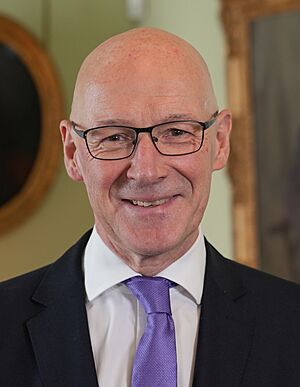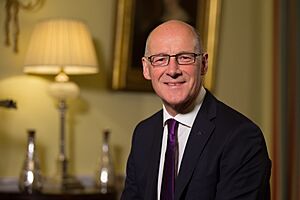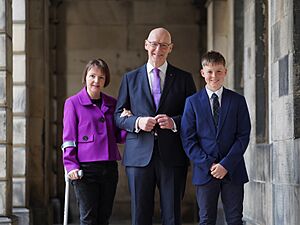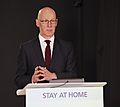John Swinney facts for kids
Quick facts for kids
John Swinney
|
|||||||||||||||||||||||||||||||||||||||||||||||||||||
|---|---|---|---|---|---|---|---|---|---|---|---|---|---|---|---|---|---|---|---|---|---|---|---|---|---|---|---|---|---|---|---|---|---|---|---|---|---|---|---|---|---|---|---|---|---|---|---|---|---|---|---|---|---|

Official portrait, 2024
|
|||||||||||||||||||||||||||||||||||||||||||||||||||||
| First Minister of Scotland | |||||||||||||||||||||||||||||||||||||||||||||||||||||
| Assumed office 8 May 2024 |
|||||||||||||||||||||||||||||||||||||||||||||||||||||
| Monarch | Charles III | ||||||||||||||||||||||||||||||||||||||||||||||||||||
| Deputy | Kate Forbes | ||||||||||||||||||||||||||||||||||||||||||||||||||||
| Preceded by | Humza Yousaf | ||||||||||||||||||||||||||||||||||||||||||||||||||||
| Leader of the Scottish National Party | |||||||||||||||||||||||||||||||||||||||||||||||||||||
| Assumed office 6 May 2024 |
|||||||||||||||||||||||||||||||||||||||||||||||||||||
| Depute | Keith Brown | ||||||||||||||||||||||||||||||||||||||||||||||||||||
| Preceded by | Humza Yousaf | ||||||||||||||||||||||||||||||||||||||||||||||||||||
| In office 26 September 2000 – 3 September 2004 |
|||||||||||||||||||||||||||||||||||||||||||||||||||||
| Depute | Roseanna Cunningham | ||||||||||||||||||||||||||||||||||||||||||||||||||||
| Preceded by | Alex Salmond | ||||||||||||||||||||||||||||||||||||||||||||||||||||
| Succeeded by | Alex Salmond | ||||||||||||||||||||||||||||||||||||||||||||||||||||
|
|||||||||||||||||||||||||||||||||||||||||||||||||||||
|
|||||||||||||||||||||||||||||||||||||||||||||||||||||
|
|||||||||||||||||||||||||||||||||||||||||||||||||||||
| Personal details | |||||||||||||||||||||||||||||||||||||||||||||||||||||
| Born |
John Ramsay Swinney
13 April 1964 Edinburgh, Scotland |
||||||||||||||||||||||||||||||||||||||||||||||||||||
| Political party | Scottish National Party | ||||||||||||||||||||||||||||||||||||||||||||||||||||
| Spouses |
Lorna King
(m. 1991; div. 1998)
(annulled 2003)Elizabeth Quigley
(m. 2003) |
||||||||||||||||||||||||||||||||||||||||||||||||||||
| Children | 3 | ||||||||||||||||||||||||||||||||||||||||||||||||||||
| Relatives | Tom Hunter (uncle) | ||||||||||||||||||||||||||||||||||||||||||||||||||||
| Residence | Bute House | ||||||||||||||||||||||||||||||||||||||||||||||||||||
| Alma mater | University of Edinburgh (MA Hons) | ||||||||||||||||||||||||||||||||||||||||||||||||||||
| Website | First Minister of Scotland |
||||||||||||||||||||||||||||||||||||||||||||||||||||
John Ramsay Swinney (born 13 April 1964) is a Scottish politician. He became the First Minister of Scotland in May 2024. He is also the leader of the Scottish National Party (SNP). He has been a member of the Scottish Parliament (MSP) since 1999.
Swinney has held many important jobs in the Scottish Government. He was the Deputy First Minister of Scotland from 2014 to 2023. He also served as a Cabinet Secretary in charge of different areas like finance, education, and COVID-19 recovery.
Contents
Early Life and Education
John Ramsay Swinney was born on 13 April 1964 in Edinburgh, Scotland. His father, Kenneth Swinney, managed a garage. His mother was Agnes Weir Swinney.
John's uncle, Tom Hunter, was a brave soldier. He received the Victoria Cross for his actions during World War II. This is a very high award for bravery.
John went to Forrester High School. After that, he studied politics at the University of Edinburgh. He earned a degree in 1986.
Political Journey
John Swinney joined the Scottish National Party (SNP) when he was young. He quickly became an important member. From 1986 to 1992, he was the SNP's National Secretary. He also served as the party's Deputy Leader from 1998 to 2000.
In 1997, Swinney became a Member of Parliament (MP) for Tayside North. This meant he worked in the British House of Commons in London.
When the Scottish Parliament was first created in 1999, Swinney was elected as an MSP. He represented North Tayside and later Perthshire North. In 2002, he became the Leader of the Opposition in the Scottish Parliament. This means he led the main party that was not in power.
Swinney was the leader of the SNP from 2000 to 2004. After stepping down, he continued to work as an MSP.
Working in Government
In 2007, the SNP won the most seats in the Scottish Parliament. Alex Salmond became the First Minister. Swinney joined his government as the Cabinet Secretary for Finance. He managed Scotland's money and economy until 2014.
When Nicola Sturgeon became First Minister in 2014, she chose Swinney as her Deputy First Minister. This is the second-highest position in the Scottish Government. He also continued to work on finance matters.
Later, Swinney took on other important roles:
- From 2016 to 2021, he was the Cabinet Secretary for Education and Skills. He was in charge of schools and learning in Scotland.
- From 2021 to 2023, he was the Cabinet Secretary for Covid Recovery. His job was to help Scotland recover from the COVID-19 pandemic.
Swinney became the longest-serving Deputy First Minister in May 2022. He resigned from his role in March 2023 when Nicola Sturgeon stepped down as First Minister.
Becoming First Minister
After Humza Yousaf resigned as First Minister in April 2024, John Swinney decided to run for the leadership of the SNP again. He was the only candidate, so he was elected without a contest.
On 8 May 2024, John Swinney officially became the First Minister of Scotland. He was sworn into office in Edinburgh. This means he is now the head of the Scottish Government.
Personal Life
John Swinney was married to Lorna King from 1991 to 1998. They had two children, Judith and Stuart.
In 2003, Swinney married Elizabeth Quigley. She was a news reporter for BBC Scotland. Elizabeth was diagnosed with Multiple Sclerosis in 2000. In 2010, they had a son named Matthew. The family lives near Blairgowrie in Perth and Kinross.
Swinney has said that his Christian faith is very important to him.
Images for kids
-
Swinney speaking in a Scottish Parliament debate, June 2000
-
Swinney with First Minister Nicola Sturgeon after his appointment as Deputy First Minister, November 2014
See also
 In Spanish: John Swinney para niños
In Spanish: John Swinney para niños
 | John T. Biggers |
 | Thomas Blackshear |
 | Mark Bradford |
 | Beverly Buchanan |









